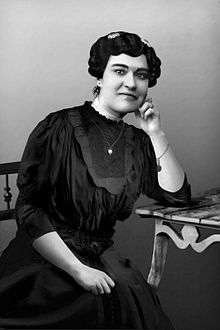Carolina Beatriz Ângelo
Carolina Beatriz Ângelo (6 April 1878 – 3 October 1911) was a Portuguese physician and the first woman to vote in Portugal. She used the ambiguity of a law, that issued the right to vote to literate head-of-households over 21, to cast her vote in the election of the Constituent National Assembly in 1911.[1][2] Shortly thereafter, on July 3, 1913, a law was passed to specify the right to vote was only for male citizens, literate and over 21.[1] Her act was widely reported on throughout Portugal and among feminist associations in other countries.[3][4]
Carolina Beatriz Ângelo | |
|---|---|
 Carolina Beatriz Ângelo | |
| Born | 6 April 1878 |
| Died | 3 October 1911 (aged 33) |
| Nationality | Portuguese |
| Education | Medical School Lisbon |
| Occupation | Physician |
| Known for | Voting in 1911, the first woman in Portugal to do so |
| Spouse(s) | Januario Barreto (1902-1910) |
| Children | Maria Emília |
| Parent(s) | Emília Clementina de Castro Barreto Viriato António Ângelo |
| Signature | |
Life
Carolina Beatriz Angelo was a medical doctor practicing in Lisbon. She was a feminist and suffragette who participated in multiple women's associations. She was a leader of the Portuguese Women's Republican League and, in 1911, she and Adelaide Cabete founded the Portuguese Association of Feminist Propaganda (Associação de Propaganda Feminista) of which Ana de Castro Osório became the head.[5][6]
Vote
On May 28, 1911 Angelo cast her vote for deputies of the Constitutional Assembly in the first elections after the fall of the monarchy.[2] Because she was both a widow and a mother of a daughter, she was considered head-of-household.
Notes
- Fauré, Christine, ed. (2004). "Political and Historical Encyclopedia of Women". Routledge: Taylor & Francis. p. 399.
- Costa Pinto, António (1998). "Modern Portugal". Society for the Promotion of Science and Scholarship. p. 171.
- Wayne, K., ed. (2011). "Feminist Writings from Ancient Times to the Modern World: A Global Sourcebook and History". ABC-CLIO. p. 374.
- "Who was Beatriz Angelo?". Hospital Beatriz Angelo.
- Janz, Oliver; Schonpflug, Daniel, eds. (2014). "Gender History in a Transnational Perspective: Networks, Biographies, Gender Orders". Berghahn Books. pp. 53, 61–62.
- Rodriguez Ruiz, Blanca; Rubio-Marín, Ruth (2012). "The Struggle for Female Suffrage in Europe: Voting to Become Citizens". Brill. p. 480.